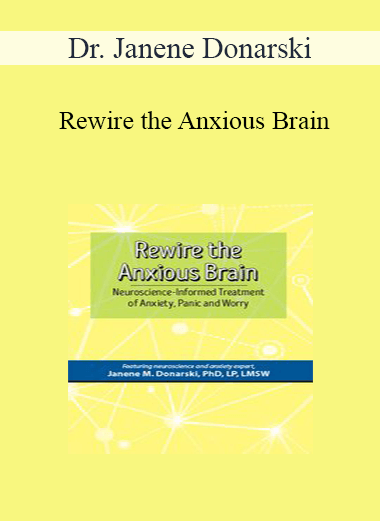$219.99 Original price was: $219.99.$41.00Current price is: $41.00.
[Instant Download] – Immediately deliver the download link after receiving the payment
 Purchase this course you will earn 41 Points worth of $4.10
Purchase this course you will earn 41 Points worth of $4.10Elevate your skills with the Dr. Janene Donarski – Rewire the Anxious Brain: Neuroscience-Informed Treatment of Anxiety, Panic and Worry course, available for just $219.99 Original price was: $219.99.$41.00Current price is: $41.00. on Utralist.com! Browse our curated selection of over 60,000 downloadable digital courses across diverse Uncategorized. Benefit from expert-led, self-paced instruction and save over 80%. Start learning smarter today!
[Instant Download] – Immediately deliver the download link after receiving the payment
Purchase Dr. Janene Donarski – Rewire the Anxious Brain: Neuroscience-Informed Treatment of Anxiety, Panic and Worry courses at here with PRICE $219.99 $41
- Faculty:
- Dr. Janene Donarski
- Duration:
- 6 Hours 17 Minutes
- Format:
- Audio and Video
- Copyright:
- Apr 28, 2020
Description
| Manual – Rewire the Anxious Brain (4.6 MB) | 88 Pages | Available after Purchase |
Outline
Use Neuroscience in the Treatment of Anxiety
- Positives:
- We know more about anxiety-based disorders than any other disorders
- Science gives explanations, evidence, authority, destigmatizes difficulties
- Concerns:
- It can be difficult to explain, answer questions
- Clients may feel a lack of responsibility
- Oversimplification is inevitable
Enhancing Engagement in Treatment
- Don’t neglect the therapeutic relationship!
- Address the challenges of anxious clients
- Remember that strategies are effortful
- Guide the process using client’s goals
- Maintain motivation
Neuroplasticity
- Define Neuroplasticity in everyday language
- Therapy is about creating a new self
- ”Rewiring” as an accessible concept for change
- Re-consolidation: the modification of emotional memories
Identify Two Neural Pathways to Anxiety
- Amygdala – bottom-up triggering of emotion, physicality of anxiety
- Cortex – top-down emotion generation based in cognition
- Explain the two pathways to clients
- How anxiety is initiated in each pathway and how pathways influence each other
Client Friendly Explanations
- Use illustrations to create concrete understanding
- Fight/flight/freeze responses
- The “language of the amygdala”
- Anxiety and the cortex
- Help clients recognize the two pathways to anxiety
Neuroplasticity in the Amygdala (Essential for all Anxiety Disorders, PTSD, OCD, Depression)
- Sleep and the amygdala
- The influence of exercise
- Breathing techniques to reduce activation
- Relaxation, meditation, and yoga to modify responses
- Exposure as opportunities for the amygdala to learn
- Combatting avoidance
- When anxiety indicates that the amygdala can learn new responses
- Push through anxiety to change the amygdala
Neuroplasticity in the Cortex (Essential for GAD, SAD, OCD, PTSD, Depression)
- ”Survival of the busiest” principle – strengthen or weaken specific circuitry
- The healthy (adaptive) use of worry in the cortex
- ”You can’t erase: You must replace”
- Recognize and modify the impact of uncertainty
- Training correct uses of distraction
- Left hemisphere techniques – cognitive defusion, coping thoughts, fighting anticipation
- Right hemisphere techniques – imagery, music
- Mindfulness and anxiety resistances
Neuroplasticity and Medications for Anxiety Disorders, OCD, PTSD, Depression
- Medication’s effects in the rewiring process
- The myth of the chemical imbalance
- The danger of sedating the brain with benzodiazepines
- Promoting neuroplasticity with SSRIs, SNRIs
- The effectiveness of CBT and meds
Moving Beyond Diagnostic Categories to Focus on Anxiety Pathways
- Anxiety is a component of many diagnoses (depression, substance abuse, etc.)
- Amygdala – and cortex-based techniques help in other disorders
- Targeting brain-based symptoms rather than disorders
- Worry, obsessions, rumination respond to similar cortex-based techniques
- Panic, phobic responses, and compulsions respond to amygdala-based techniques
Research, Risks and Limitations
- Empirical versus clinical and anecdotal evidence
- Clinical considerations for specific clients and settings
- Efficacy of particular interventions may vary
Faculty

Dr. Janene Donarski, PH.D., L.P., LMSW, CCATP Related seminars and products: 4
FTDC
Dr. Janene M. Donarski, PhD, LP, LMSW, CCATP, is a fully Licensed Clinical Psychologist and Licensed Master Social Worker who works in counseling therapy as well as psychological testing for mental health issues. Dr. Donarski specializes in neuropsychological assessment of children, adolescents, adults and geriatric populations including head injury, organic issues, emotional and complex behavior disorders. Dr. Donarski works extensively with anxiety issues including panic, hypervigilance and PTSD. She trains others in techniques of relaxation, reduction of fear, and exposure therapies to reduce triggers and symptoms in daily life. She also assists in testing within the academic areas including ADHD, learning disabilities and autism for IEPs and/or 504 plans/behavior plans. Dr. Donarski works with all populations in counseling/therapy, including individual, marital/couple, family, LGBTQ, and group counseling. She is a certified EMDR Level II counselor, as well as a certified hypnotherapist and practitioner for Neuro-Linguistic Programming and Time Line Therapy®. Dr. Donarski is also experienced in working with victims of violence, foster care/adoption issues, sexual issues, as well as those who are seeking sex offender treatment. She often works with attorneys as a forensic psychologist/expert witness for legal cases involving custody, guardianship, social security benefits, and criminal cases. Dr. Donarski has spoken on a variety of mental health issues, including somatic ailments, behavioral disorders and mental health concerns in the geriatric population.
Speaker Disclosures:
Financial: Janene Donarski has an employment relationship with Family Therapy & Development Centers, Inc. She receives a speaking honorarium from PESI, Inc.
Non-financial: Janene Donarski is a member of the American Psychological Association; Michigan Psychological Association; and National Association of Social Workers.
Purchase Dr. Janene Donarski – Rewire the Anxious Brain: Neuroscience-Informed Treatment of Anxiety, Panic and Worry courses at here with PRICE $219.99 $41
Cultivate continuous growth with the Dr. Janene Donarski – Rewire the Anxious Brain: Neuroscience-Informed Treatment of Anxiety, Panic and Worry course at Utralist.com! Unlock lifetime access to premium digital content, meticulously designed for both career advancement and personal enrichment.
- Lifetime Access: Enjoy limitless access to your purchased courses.
- Exceptional Value: Benefit from savings up to 80% on high-quality courses.
- Secure Transactions: Your payments are always safe and protected.
- Practical Application: Gain real-world skills applicable to your goals.
- Instant Accessibility: Begin your learning journey immediately after buying.
- Device Compatible: Access your courses seamlessly on any device.
Transform your potential with Utralist.com!
Related products
Uncategorized
= 85 Points
Uncategorized
Optimizing Compliance and Maximizing Revenue for Ophthalmology and Optometry – Jeffrey P. Restuccio
= 85 Points
Uncategorized
= 35 Points
Uncategorized
= 85 Points
Uncategorized
= 85 Points
= 125 Points
= 125 Points
Uncategorized
= 85 Points





